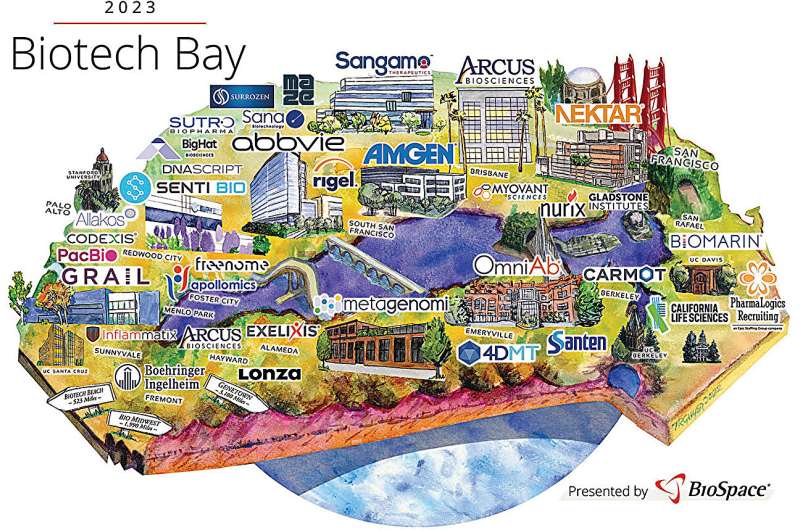This article has been reviewed according to Science X's editorial process and policies. Editors have highlighted the following attributes while ensuring the content's credibility:
fact-checked
trusted source
proofread
Global research compares regional relationships with Big Pharma

During their time on campus, recent University of California Santa Cruz graduates Ted Malpass and Edwina Malmberg channeled their passion for health equity issues into undergraduate research. Now, the study they helped to author is published in the peer-reviewed journal, Area Development and Policy, and is shedding new light on how local and national governments deal with the trade-offs between economic benefits and health benefits in their relations with the biopharmaceutical industry.
Global & Community Health Program Executive Vice Director Matt Sparke led the research team in comparing biopharmaceutical hubs in California, Puerto Rico, China, Singapore, and South Africa. The article's findings detail the varying strategies that governments use to attract and manage the industry, focusing in particular on the different types of economic value and health value that these efforts provide, or fail to provide, to citizens.
Malmberg, who majored in sociology, first got involved with the project through the Institute for Social Transformation's Building Belonging program, which provides fellowship funding for undergraduates to work alongside faculty on research projects. As a transfer student, she said the program helped her to make the most out of her time on campus. She also enjoyed bringing her Spanish-language skills to the team and realized that she'd like to continue doing research as she pursues a career in public health.
"This research experience has given me a new lens on how to go into my professional life," she said. "It was fun in a way that I was not expecting. Some of the types of information that we were looking for about these biopharmaceutical companies are not straightforward to find and make sense of, so it was a bit of a puzzle and a challenge that we had to overcome."
Sparke said the research team's work comparing governance models for the biopharmaceutical industry was all the more important in the wake of the COVID-19 pandemic, which demonstrated vast inequities in access to vaccines and other medications around the globe.
"People in the Global South have always been very familiar with unequal access to medicines, and we also experience it to some degree within our population here in the United States," he said. "It remains a huge problem, and most governments have found themselves very weakly positioned in relation to Big Pharma. They therefore often tend to be price takers, rather than price makers."
In the United States, for example, the paper explains that governments provide public funding, infrastructure, and tax incentives to support the development of biopharmaceutical hubs, and the industry then helps contribute to regional economic growth. But the research team argues that these policies also turn public resources into private profits, creating corporate monopolies that reduce the affordability and accessibility of medications for populations both locally and globally.
Countries like China and Singapore take different approaches that aim to capture increased health benefits alongside the economic value of biopharmaceutical innovation, the paper shows. It details how China's policies focus partly on domestic procurement and production of medicines to support biosecurity goals. And Singapore encourages companies to tailor medicines to the needs of the local population by hosting clinical trials and serving as an experimental frontier. However, biomedical development is still primarily market-based under both models.
Meanwhile, South Africa's public health care system provides antiretroviral drugs to citizens for AIDS treatment, and the paper discusses how the government's role in purchasing such medications relates to its efforts to regulate monopoly pricing. South Africa also promotes domestic production of essential medicines and is working toward state production of active pharmaceutical ingredients.
In the wake of the coronavirus pandemic, the World Health Organization picked Cape Town, South Africa, to serve as a new mRNA vaccine hub, with the goal of both producing medications and sharing technology throughout the Global South.
The paper argues that the new Cape Town mRNA hub, in particular, shows how a different type of governance of the biopharmaceutical industry is possible. The researchers also shared some evidence of changes that might be coming to the United States. For example, the paper discusses how medicare price caps and other recent federal policies, along with efforts by the state of California to produce its own insulin, successfully pressured the biopharmaceutical industry to lower costs of the medication.
"Those efforts have made great progress in pushing down the prices on insulin, and this is a lifesaving transformation," Sparke said. "People were rationing supplies because they couldn't afford the amount of medicine that they needed, and some people were dying as a result. Now, that's going to change. This is a huge policy achievement, not least of all here in California, that really should be more widely acknowledged."
For undergraduate student co-author Ted Malpass, studying this success story was one of the most exciting aspects of the research. Malpass, who recently graduated with a degree in politics, is a type 1 diabetic and has sometimes struggled to afford insulin. Those experiences inspired him to found a chapter of Universities Allied for Universal Medicines (UAEM) at UC Santa Cruz and to join the research team working on the article. Now, Malpass hopes to continue his advocacy for affordable health care through his career.
More information: Matthew Sparke et al, Bio-pharma hub development in global production networks: contrasting state policies and conjunctural value strategies, Area Development and Policy (2023). DOI: 10.1080/23792949.2023.2216258





















